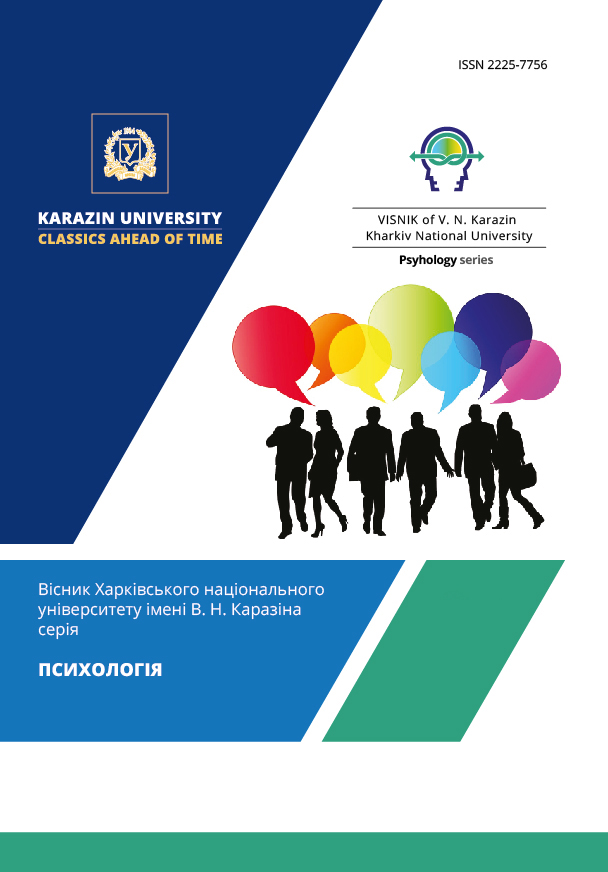The Impact of Negative Personality Memories on the Features of Self-Perception
Abstract
The question of the memory impact on personality is topical and requires experimental research. The article presents theoretical analysis of autobiographical memory aspects that can combine the areas of personality functioning and mnemonic processes. In the context of the development of G.K. Sereda's ideas about the relationship and interaction of memory and personality, an empirical study was conducted to elicit the impact of negative memories on self-perception characteristics of personality in middle-aged and older people. R. Cattell's Sixteen Personality Factor Questionnaire was chosen as a method of studying the peculiarities of self-perception. Between two stages of the questionnaire application we used the autobiographical interview, designed to actualize negative memories, that took the position of experimental intervention and became a source of memories as a material for qualitative analysis. The study involved 32 participants from different professions with a middle age fluctuating near 57. It has been found that among middle-aged and older people the actualization of negative memories leads to certain changes in personality self-perception immediately after the process of recollection. Above all, these changes refer to self-control, courage, self-esteem, dominance, warmth, emotional stability, abstractedness, apprehension, self-reliance, openness to change, vigilance, liveliness, sensitivity, privateness and rule-consciousness. So undoubtedly, negative memories have some influence on changes in one's vision of one's own personality, but variously, in different ways. As it has been demonstrated, these changes are related to the organization of the narrative, the accompanying and following reactions, the thematic focus of the story etc. The obtained results confirmed G.K. Sereda`s assumption about the impact of memory on the personality, at least within a short period of time.
Downloads
References
Baddeley, A. D., Eysenck, M. W., & Anderson, M. C. (2015). Memory (Second edition). Psychology Press. https://docer.com.ar/doc/nx100ee
Brown, N. R. (2021). The possible effects of the COVID-19 pandemic on the contents and organization of autobiographical memory: A Transition-Theory perspective. Cognition, 212, 104694. https://doi.org/10.1016/j.cognition.2021.104694
Cassol, H., Bonin, E., Bastin, C., Puttaert, N., Charland-Verville, V., Laureys, S., & Martial, C. (2020). Near-Death Experience Memories Include More Episodic Components Than Flashbulb Memories. Frontiers in psychology, 11, 888. https://doi.org/10.3389/fpsyg.2020.00888
Fivush, R., Habermas, T., Waters, T. E., & Zaman, W. (2011). The making of autobiographical memory: intersections of culture, narratives and identity. International journal of psychology, 46(5), 321–345. https://doi.org/10.1080/00207594.2011.596541
Zinchenko, P. I. (2010). Involuntary memory. Moscow: Directmedia Publishing. [in Russian]
Ivanova, O. F. (2021). Autobiographical memory as a personal resource, Proceedings of the scientific-practical conference "Problems of personal resources in educational and professional activities". Kharkiv: V. N. Karazin Kharkiv National University. [in Ukrainian]
Ivanova, O. F. (2017). Cultural memory and its influence on autobiographical memory. The Journal of V. N. Karazin Kharkiv National University. A Series of «Psychology», (62), 44–47. Retrieved from https://periodicals.karazin.ua/psychology/article/view/9411 [in Ukrainian]
Ivcevic, Z., Pillemer, D. B., Wang, Q., Hou, Y., Tang, H., Mohoric, T., & Taksic, V. (2008). When we feel good and bad about ourselves: self-esteem memories across cultures. Memory (Hove, England), 16(7), 703–711. https://doi.org/10.1080/09658210802251406
Kapoustina, A. N. (2001). The multifactorial personality technique of R. Kettell. Sankt-Peterburg: Rec`. [in Russian]
LePort, A. K., Stark, S. M., McGaugh, J. L., & Stark, C. E. (2016). Highly Superior Autobiographical Memory: Quality and Quantity of Retention Over Time. Frontiers in psychology, 6, 2017. https://doi.org/10.3389/fpsyg.2015.02017
Lyubomirsky, S., Sousa, L., & Dickerhoof, R. (2006). The costs and benefits of writing, talking, and thinking about life's triumphs and defeats. Journal of personality and social psychology, 90(4), 692–708. https://doi.org/10.1037/0022-3514.90.4.692
Nourkova, V. V. (2009). Cultural-historical Approach to Autobiographical Memory. [Doctoral thesis, Moscow State University]. Moscow. [in Russian]
Nourkova, V. V. (2022). Self-defining Memories in the System of Self-Memory Interfunctional Relationships. Cultural-Historical Psychology, 18(1), 79–89. https://doi.org/10.17759/chp.2022180108 [in Russian]
Nourkova, V. V., & Vasilenko, D. A. (2013). Forming of variative repertory of self-defining recollections as mean for developing of self-identity. RSUH/RGGU Bulletin. Series: Psychological Studies, 18 (119), 11–30. Retrieved from https://cyberleninka.ru/article/n/formirovanie-variativnogo-repertuara-samoopredelyayuschih-vospominaniy-kak-sredstvo-razvitiya-samoidentichnosti-1/viewer [in Russian]
Patihis, L., Frenda, S. J., LePort, A. K. R., Petersen, N., Nichols, R. M., Stark, C. E. L., McGaugh, J. L., & Loftus, E. F. (2013). False memories in highly superior autobiographical memory individuals. PNAS Proceedings of the National Academy of Sciences of the United States of America, 110(52), 20947–20952. https://doi.org/10.1073/pnas.1314373110
Ross, M., & Wang, Q. (2010). Why We Remember and What We Remember: Culture and Autobiographical Memory. Perspectives on psychological science : a journal of the Association for Psychological Science, 5(4), 401–409. https://doi.org/10.1177/1745691610375555
Sereda, G. K. (2010). Selected psychological works. Kharkiv: V. N. Karazin Kharkiv National University. [in Russian]
Citations
Evolution of The Concept of Learning Task in Developmental Teaching
Riepkin Volodymyr & Repkina Nataliуa (2025) Visnyk of V. N. Karazin Kharkiv National University. A Series of Psychology
Crossref




